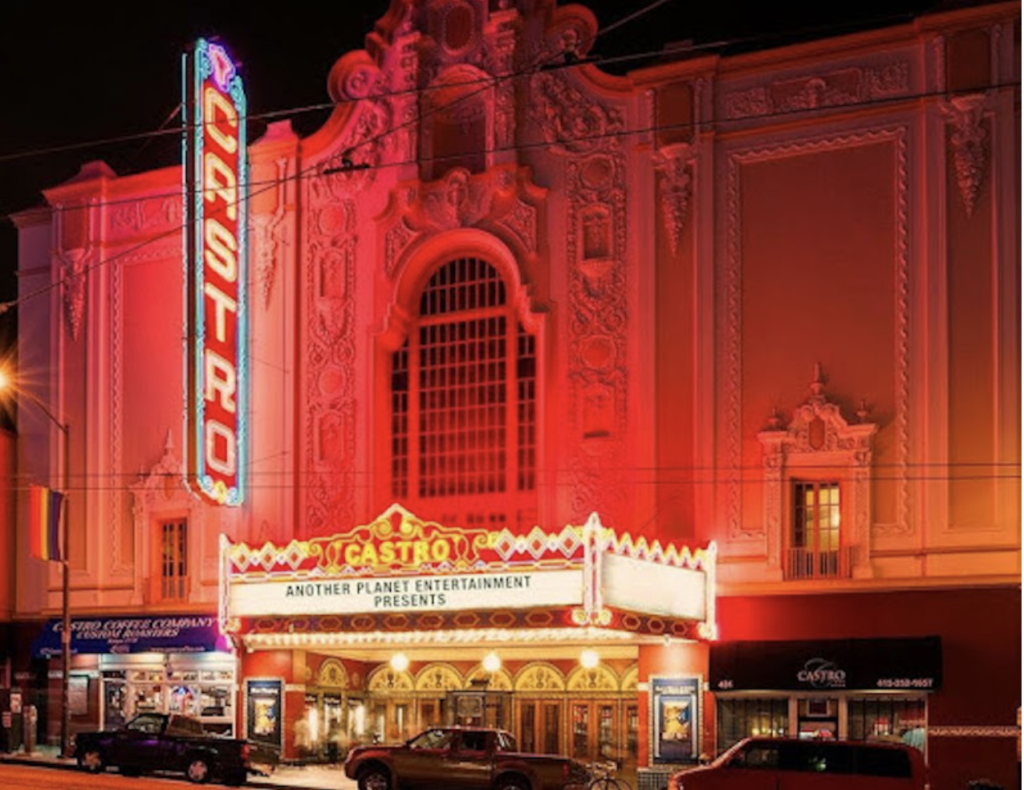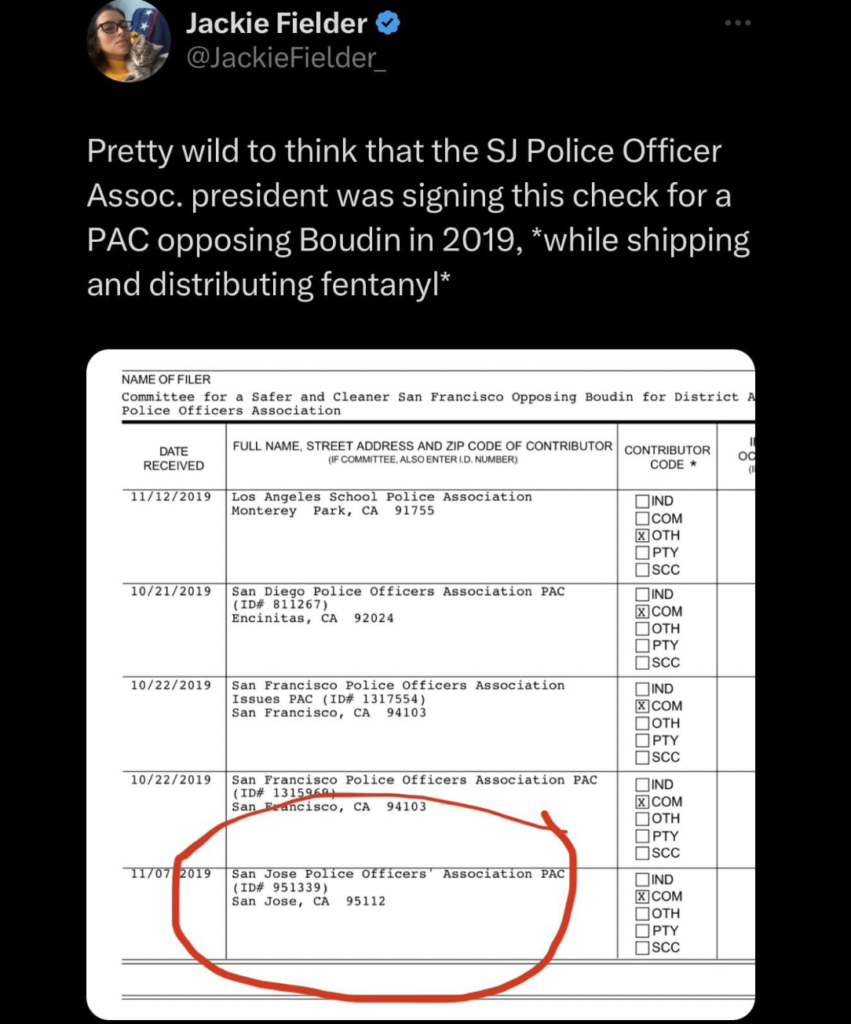The fate of the Castro Theater could hinge on a few words in a measure that comes before the Board of Supes Land Use and Transportation Committee Monday/3.
The issue is both complicated and potentially profound. The theater is in the heart of the Castro District, has deep roots in the LBGTQ community, and needs a lot of expensive upgrades.

Another Planet Entertainment has a long-term lease on the place, and wants to expand it beyond movies and use it as a live music venue.
As part of that project, APE would put as much as $20 million into restoring the facility—but the company also wants to remove the current seats and replace the raked floor with a plan for movable seats that would make concerts easier.
The Historic Preservation Commission sort of, kind of, agreed to landmark the interior, but stopped short of specifically saying the existing seating needs to stay.
So now the issue is coming, as we knew it would, to the supes.
Gerard Koskovich, an LGBTQ historian, along with four other preservation experts, sent a letter to the committee asking for what seems like a modest amendment to the landmark proposal:
Given the findings in the Landmark Designation Fact Sheet and given the exceptional significance of the orchestra configuration and the movie-palace seating for film heritage and LGBTQ intangible cultural heritage, we request that the Committee clarify the language in Section 4(c)(2)(D) of the Draft Landmark Designation Ordinance as follows: Strike the words “presence of seating” and substitute the words “fixed theatrical seating configured in movie-palace style.” By making this modest revision, the Committee will ensure the Draft Ordinance clearly reflects the factual findings approved by the Historic Preservation Commission and will further the protection of the Castro Theatre as both a historic movie palace and a site of international significance for LGBTQ intangible cultural heritage.
That language would require APE to retain the existing floor pretty much as it is.
Help us save local journalism!
Every tax-deductible donation helps us grow to cover the issues that mean the most to our community. Become a 48 Hills Hero and support the only daily progressive news source in the Bay Area.
APE argues that the Castro can’t survive as a venue that primarily shows movies; that business model, the group says, doesn’t work today. The only way to pay for the renovations is to turn it into a live music venue that also on occasion shows movies.
David Perry, a spokesperson for APE, told me:
As we have from the beginning, Another Planet fully supports the landmarking of the interior of the Castro Theatre and agrees with the Historic Preservation Commission’s unanimous vote to do so, including the present wording which reflects new adaptable seating to replace the current seats installed in 2001. The new planned seating will include raked sightlines ideal for film and also other community and cultural events.
In other words: APE is happy for the supes to landmark the place, but not the existing seating and raked floor. Saving the existing seating “would be a significant impediment to APE’s plans,” Perry said.
There does not appear to be an imminent compromise that all sides will accept.
Sup. Aaron Peskin and Mayor London Breed want to make it easier for developers to convert office buildings into housing, which sounds like a grand idea for downtown: Office buildings are increasingly empty, and the city is supposed to figure out how to get a massive amount of new housing built.
(By the way, the RHNA numbers don’t seem to account for the fact that San Francisco, rather than growing, is now losing population, and jobs.)
But turning offices into housing isn’t easy or cheap. As the Budget and Legislative Analyst notes:
Despite available commercial land, its conversion to housing does not offer a panacea for solving the state’s housing problems, as such projects are often costly and complex from an architectural and engineering standpoint. Such conversions accounted for only 9.7 percent of the 24,515 net new housing units added to San Francisco’s housing stock between 2014 and 2019, the Terner Center reports.
And let’s remember: the biggest challenge the city faces is the need for affordable housing, $19 billion worth. The expense of turning offices into housing might not be the best way to solve that problem.
Unless (and I know this is a long shot) the city took over those buildings, and turned them into artist live-work spaces and housing for formerly homeless people, with the occupants doing some of the conversion work and getting sweat equity. (Imagine what the folks at Homefulness could do with a million square feet of empty office space.)
Sups. Ahsha Safai and Catherine Stefani have asked for a hearing on the issue, and that will also be at LUT. The meeting starts at 1:30pm.
I wonder if anyone will talk about this.
The Rules Committee will consider changing the board’s rules to allow remote comment as a permanent part of future operations. The rules change would preserve a practice that was started during the pandemic, when the board met remotely, but has become increasingly popular for people who can’t make it to City Hall or can’t wait for hours in a hearing room to give their two minutes of public comment.
A clear majority of the supes supports continuing remote comment, although Sup. Rafael Mandelman tried to limit it.
The rules change would also eliminate the ability of the board president to limit public comment to 30 minutes—a power that hasn’t been used in many years.
As the budget deficit appears to worsen, the Police Department is the only agency in the city that isn’t facing cuts. Instead, the cops are set to get a hefty increase, and some of that is reflected in the Memorandum of Understanding that will come before the Government Audit and Oversight Committee. The MOU calls for significant raises for cops.
I miss the late John Crew so much, and I will never forget what he used to say, over and over, at Police Commission meetings and Board of Supes meetings:
It’s fine to pay the SF cops the best salaries in the country—but in exchange we ought to get the best professionals in the country. And all too often, it’s amateur hour.
This MOU gives the cops everything they want, and in exchange the city gets nothing new—no new ability to hold killer cops accountable, no changes in the climate of secrecy at the department … it’s a one-sided contract.
The same thing happened in 2020.
If nothing else, the city could demand that future negotiations have much sunshine, and that the police union will stop using “meet-and-confer” tactics to delay reforms.
Given the current climate, I suspect that won’t happen. But at least we’ll get a hearing. The meeting starts at 10am.
The full board will consider a settlement deal with Walmart and CVS over the allegedly improper dispensing of opioids that that could net the city between $7.1 and $18.8 million over six years. It’s part of a series of national cases related to the opioid epidemic.
The supes are going to approve the deal, I’m sure, but it’s relevant because some say that the money could be used to fund safe-injection sites in the city. The law on this is unclear: Since Gov. Gavin Newsom decided that his immediate political future is more important than saving lives, it’s harder for cities to fund what most public-health advocates agree is an effective approach to IV drug problems.
But maybe the settlement money could go to fund the sites. That would be a question for City Attorney David Chiu, who has been far less willing than his predecessor to take risks.
And just for the record: The executive director of the San Jose Police Officers association has been charged with importing significant amounts of powerful and dangerous opioids, including fentanyl, at the same time as that union was donating money to oppose San Francisco DA Chesa Boudin—in part because the cops thought he wasn’t going to be tough enough on small-time street-level fentanyl dealers.
From Jackie Fielder:





